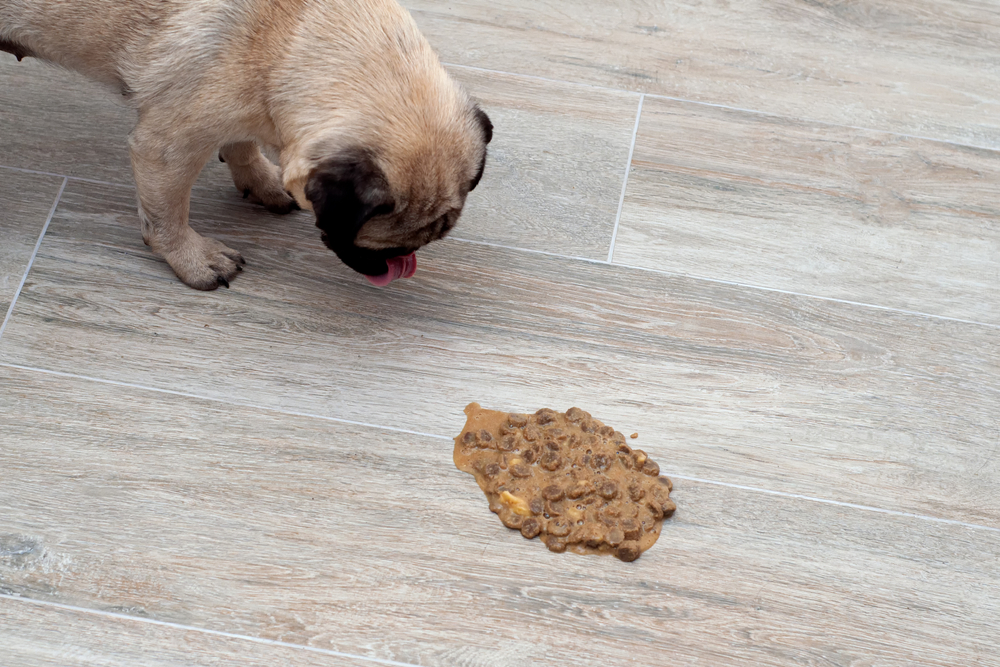The unmistakable noise comes from downstairs—and then pulses into a steady countdown, a warning of impending carpet damage. Nothing causes a pet owner to leap into action faster than the sound of their dog preparing to vomit. The unmistakable retching sound could be used to rouse comatose patients.
Dogs vomit for a myriad of reasons, and knowing when they need veterinary attention can be hard. So, to help you know when to schedule an appointment at Animal Medical Hospital of Naples, we spill the facts on why dogs vomit, and what you need to do—after you race them to the door, or at least a tile floor.
What goes down may come up—vomiting and regurgitation in dogs
All “returned goods” are not created equal. Determining the nature of your dog’s symphonic stomach stirrings is important—is your dog vomiting or regurgitating?
Vomiting is an active attempt by your dog to expel their stomach contents, and typically involves visible effort and preparation, such as:
- Eating grass to stimulate vomiting
- Digging at carpet or blankets
- Restlessly pacing, or circling
- Posturing—some dogs will lie down, while others stand with their head low
- Visibly using abdominal effort, like heaving
Regurgitation is a passive process that looks involuntary, similar to a baby spitting up, and differs from vomiting in the following ways:
- Is often noiseless, without warning
- May be reflexive, often after a dog consumes a large volume of food or water
- Requires no physical preparation or effort beforehand
Vomiting and regurgitation have different potential causes and require different treatment, and owners should therefore have a basic understanding of each.
Smells like trouble—when to seek veterinary attention for your dog
An occasional vomiting episode may be nothing to fear, but you should contact Animal Medical Hospital of Naples to schedule an appointment if your dog:
- Has acute vomiting (i.e., frequent vomiting after a sudden onset)
- Has chronic vomiting (i.e., intermittent vomiting several times per week)
- Is a puppy
- Is lethargic or weak, with a reduced appetite
- Has diarrhea
- Is losing weight
- Vomits large amounts of food or bile
- Retches, but produces no vomit
- Has blood in their vomit or diarrhea
- May have eaten something (e.g., a bone, toy, or chemical substance) that could be an obstruction or toxic
- Is weak
- Collapses
The prognosis for a vomiting dog can range from benign to emergency, so pay attention to any changes in your dog’s behavior or health.
Determining your dog’s emesis nemesis—why dogs vomit
The following list includes some of the most common reasons dogs vomit, which may be chronic or acute.
Chronic vomiting may be caused by the following:
- Dietary reaction — Infrequent vomiting (i.e., a couple of times per week) may be because of a food sensitivity or irritable bowel disease. The dog’s gastrointestinal tract reacts to specific ingredients in their food, causing irritation and inflammation. Dogs who consistently eat too much and/or too fast may chronically vomit.
- Illness and disease — Metabolic disorders, kidney failure, liver failure, and cancer can cause chronic vomiting as compromised organs create an imbalance or toxicity in the body, and pets suffer frequent nausea.
Pets with acute or sudden vomiting may be experiencing any of the following situations:
- Taking on air (i.e., bloat) — Unproductive vomiting is a hallmark sign of bloat (i.e., gastric dilatation and volvulus), where the dog’s stomach twists on its axis and fills with gas, requiring lifesaving emergency surgery.
- A big (parvo)virus in a little puppy — Parvovirus is potentially fatal for puppies, who can dehydrate rapidly, and may require hospitalization to reduce nausea, correct hydration, and protect against secondary infections.
- Food that hurts — Salty, sugary, fatty, and rich foods are inappropriate for the canine digestive system, and such dietary indiscretions can lead to painful inflammation of the pancreas or gallbladder.
- Stress and excitement — Good and bad emotional situations can trigger stomach upset.
- Foreign bodies that don’t fit — Some dogs will eat anything, and a bone, toy, or other indigestible item can cause a dangerous blockage of the esophagus, stomach, or small intestine. Foreign body blockages likely require endoscopic or surgical removal.
- Poison can taste bad, or good — Ingesting toxic substances can cause nausea, or acute liver or kidney failure, with vomiting.
Stop the vomit—diagnosis and treatment of vomiting in dogs
A physical examination and diagnostics such as blood work, urinalysis, and fecal testing can help determine the cause of your dog’s vomiting. If a blockage or bloat is suspected, X-rays or ultrasound imaging will help confirm the diagnosis.
Treatment depends on diagnosis and prognosis, but mild cases are often resolved with anti-nausea medication, subcutaneous fluids, acid reducers, or gastrointestinal motility medication, and a bland diet or change in regular diet. An obstruction or bloat will require surgery.
Hasta la vista, hurling—prevention of vomiting in dogs

Although all vomiting cannot—and should not—be prevented, you can help settle your dog’s stomach by:
- Keeping them up to date on vaccinations to prevent viral diseases
- Switching dog foods gradually
- Not feeding rich or unusual human foods
- Using a slow-feeder bowl
- Supervising them while they play with toys or bones, to prevent ingestion
- Never leaving them unsupervised outdoors
- Keeping all pet toxins out of reach in closed containers
- Not feeding them before or after a stressful event
To determine if your suddenly vomiting dog needs veterinary attention, or to schedule a wellness examination if they vomit only occasionally, contact Animal Medical Hospital of Naples.






Leave A Comment